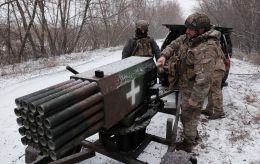Indian expert Swasti Rao: US is a much more important partner for India than Russia
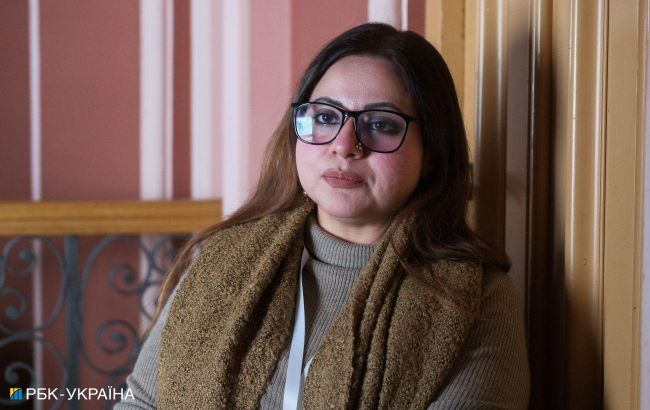 Swasti Rao (all photos: Vitalii Nosach/RBC-Ukraine)
Swasti Rao (all photos: Vitalii Nosach/RBC-Ukraine)
Swasti Rao, Associate Fellow at the Europe and Eurasia Center, Institute for Defense Studies and Analyses, speaks in an interview to RBC-Ukraine on why India still buys Russian oil, whether it is ready to mediate between Ukraine and Russia, how Russian propaganda works in India, and how Ukraine can reach out to Indians.
India is one of the most powerful countries in the modern world, which in some areas is already competing with the United States or China. In terms of economic and population growth, it is even overtaking them. It is not surprising that many countries of the Global South - in Asia, and even East Africa, with which India shares a colonial past - look up to India.
India also still has ties with Russia. They are gradually weakening because it is not profitable for India to be dependent on a rogue country. New Delhi is increasingly oriented toward the West. Nevertheless, in the medium term, ties with Russia will continue.
But all of this does not negate India's importance for Ukraine. For example, as a possible mediator in contact with Russia at the current stage of the war. However, New Delhi's position is quite cautious. And this is a reality that will not change in the near future.
“I would say Ukraine should pursue a strategy of what is called Russia plus one, which means that, okay, you have your ties with Russia, you can take care of that. But you should also be open to developing ties with Ukraine and the larger world and maybe stabilize the East European security theater by being a country that is committed to peace,” Swasti Rao, Associate Fellow at the Europe and Eurasia Center at Manohar Parrikar Institute for Defense Studies and Analyses, told RBC-Ukraine.
Working in a leading think tank under the auspices of the Indian Ministry of Defense, Rao says that her country also faces the problem of maintaining Soviet equipment, which is still in abundance in India's arsenal. And in this regard, some prospects are opening up for Ukraine. Not to mention the fact that the lion's share of the Indian fleet is powered by Ukrainian-made gas turbine engines.
RBC-Ukraine devoted a substantial part of the conversation with the Indian expert to Russian propaganda and countering it. Rao acknowledges that Russian narratives about the war are very popular in India, but points out that “Ukraine is doing a great job,” of course, given its limited resources.
– Some time earlier – and especially after the visit of Prime Minister Modi to Kyiv – there used to be an idea that India could be some kind of 'moderator' between Ukraine and Russia. Does India want to be a moderator?
– I think, this is one thing that the country has maintained from the very beginning and also the leadership has maintained from the very beginning – that India would not like to pick a side and India would like to be on the side of peace. This is the official statement, and India has been making a lot of efforts to bring about some kind of mediation.
But, as you know, in the Russia-Ukraine war, any such mediation will not work unless the timing is correct for the war to end. So, in the last 2-3 years, if you see, India has made a lot of effort to build more communication because today we are in a situation where we have good ties with Russia, we have good ties with the West. And we are also hopeful that tomorrow, whenever the war will come to an end, and they will need to have somebody that can actually bridge this gap, India can really be a part of it.
And the Ukrainian side has also shown a lot of, I would say, appreciation for the fact that India has tried to maintain its neutrality, even though India has historically been on very good terms with Russia. But India has not sided with anybody. India is saying that we are committed to peace. So I think whenever the time is right, India will try its best to bring about innovative solutions to bring the war to an end.
– We have a Chinese-Brazilian peace plan, Hungary suggests its vision of peace. Even African countries had a peace plan, but not India. Why?
– India has not come up with a peace plan, but India has always said that we basically uphold the United Nations Charter and international law. India has not come up with a peace plan because right now India believes that if there has to be one peace plan, both sides have to agree to it. And so far, if you have noticed, Russia has annexed four territories from Ukraine and of course, Crimea has already been annexed in 2014 and Ukraine has been insisting on 1991 borders.
So even though India stands by international law and the United Nations Charter, the very reason that India has not come up with a peace plan is because India thinks that unless there is a compromise that is agreed upon by both sides, a real negotiation cannot happen. So that is the official reason.
But my opinion is that India has not come up with a peace plan because right now no peace plan can work. I mean, in my opinion, there have been so many peace plans. The Chinese have come up with them, the Turkish side has come up with one. Even now there are talks about how to create a demilitarized zone.
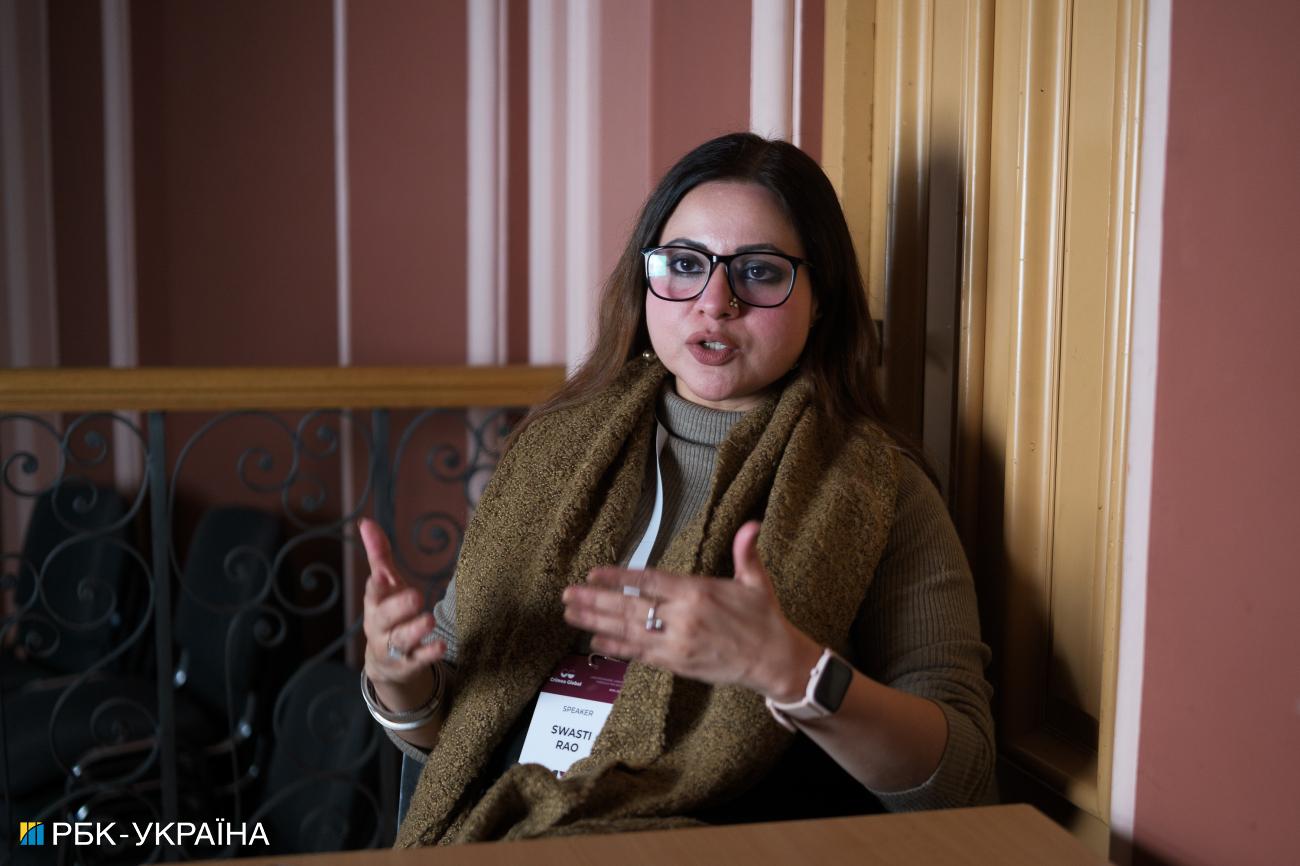
Everybody has a peace plan. Ultimately it has to be acceptable to Ukrainians. I think this is a war that is being fought on Ukrainian land, and it has to be acceptable to Ukrainians. We are waiting for that. We are nobody to give them a solution. I think that is what India is maintaining.
– India has its own national interests and used to be dependent on Russia, especially in buying weapons. How has the situation changed during the last years?
– Historically speaking, India has been dependent on Russian weapons because our ties with Russia go very long back. Now what happened, under the Prime Minister Modi government for many last years India has been trying to diversify away from Russian dependence. So this has nothing to do with only Russia-Ukraine war.
We were aware of our dependence on Russia and we wanted to diversify to other partners. COVID has also taught us that dependence or over-dependence on one source is not good. So we want to build more resilience in our supply chains.
What the Russia-Ukraine war did was that it accelerated that process, because Russia's military-industrial complex became very focused on its own war effort in Ukraine. Secondly, the export base of Russia has shrunk. So, from 31 countries before the war, Russia is now only exporting to about 11 or 12 countries. And out of those 11 or 12 countries, it exports a lot of weapons to China, to North Korea, to Iran. And of course, India is also one of them, (because we have placed previous orders with Russia) that Russia is giving to us now, slowly.
Having said that, there are problems with supplies. There are problems with spare parts. You know that the famous air defense system, the S-400 air defense system. India had placed an order with Russia in 2018 for five units of S-400 systems. And so far, we have only received three. We are still waiting for two, which have been delayed because of the Ukraine war.
The other point why this makes sense for India to diversify – Russia is now cut off from Western technology, now we are also studying what kind of Chinese components Russia is using and what kind of infiltration of the Chinese information systems, or the Chinese chips, for example there would be, or the dual-use technology that would be in Russian systems because that is a security concern for India.
And finally, today, if you look at the last five years, we have really tried to diversify away from Russian weapons. We are now getting more and more weapons from the US, from France, from Israel. As for Ukraine, also I want to make a point (which not many people know) that even today 130 warships of the Indian naval fleet have gas turbine engines from Ukraine.
Most of the aircraft especially the Soviet air aircraft that we operate have gas turbine engines from Ukraine. Ukraine was in the process of modernizing our AN-32 transport aircraft. The Ukraine-India technical-military cooperation has been going on very steady and this is an important point to realize. Because I mean Ukraine has come up as a reliable partner too and this is something that we really appreciate.
In fact, the four warships, very recent warships that India had ordered to Russia back in 2016, two of them were supposed to be made at the Kaliningrad shipyard, and two of them were supposed to be made in India. All four have gas turbine engines from Ukraine.
After 2014, when Ukraine and Russia had tensions over Crimea India imported those engines from Ukraine, sent them to Russia, so that they were able to give us the ships.
And my last point is that, yes, we are also watching how the Western sanctions, the pressure on the Russian military-industrial complex work out, because in the last three years of the Russia-Ukraine war, India has not yet placed a new order with Russia and that is of very high significance.
– As Russia is strongly isolated now are there any discussions in India to increase cooperation with Ukraine?
– The one thing that India is very, very interested in and watching very closely is drone warfare. Because Ukraine has been a pioneer when it comes to developing different kinds of drones, especially UAVs. And also the sea drones. I think Ukraine has been very, very successful in that. So India is watching that very closely, of course. And India would be interested in Ukrainian companies if they are willing to invest.
And in fact, not many people know that there are two defense industrial corridors coming up in India, which is a Ministry of Defense project (a package of infrastructure spending allocated to a specific geographical area, with the intent to stimulate industrial development - ed.). And in those corridors, we are looking for investments from different parts of the world.
And the other thing is that Ukraine can be a reliable partner, I am saying that Ukraine has already been a very important partner. And for the next decade or more than that, we really would need the Ukrainian gas turbine engines. So those are the kind of things which are very important for us. And that is the reason why I also mentioned in my panel that Bharat Forge, which is an Indian defense company, has actually bought 51% stakes in a Ukrainian company Zorya.
So those are things which are continuing. It is just that we don't speak about it too much, but the fact of the matter is that for our Soviet-era equipment, we cannot diversify or we cannot westernize overnight. We are buying the new aircraft, we are buying from Western partners, which is a different kind of technology. But we have a lot of Soviet-era equipment and for the modernization of that equipment, for the maintenance of that equipment, we are looking for reliable supply chains.
And in that regard, the importance of Ukraine is sometimes overlooked, but the reality is that Ukraine remains a very important player for India. And maybe in the future, we can learn a lot from how the Ukrainians have developed their drone warfare, which has been so helpful to them.
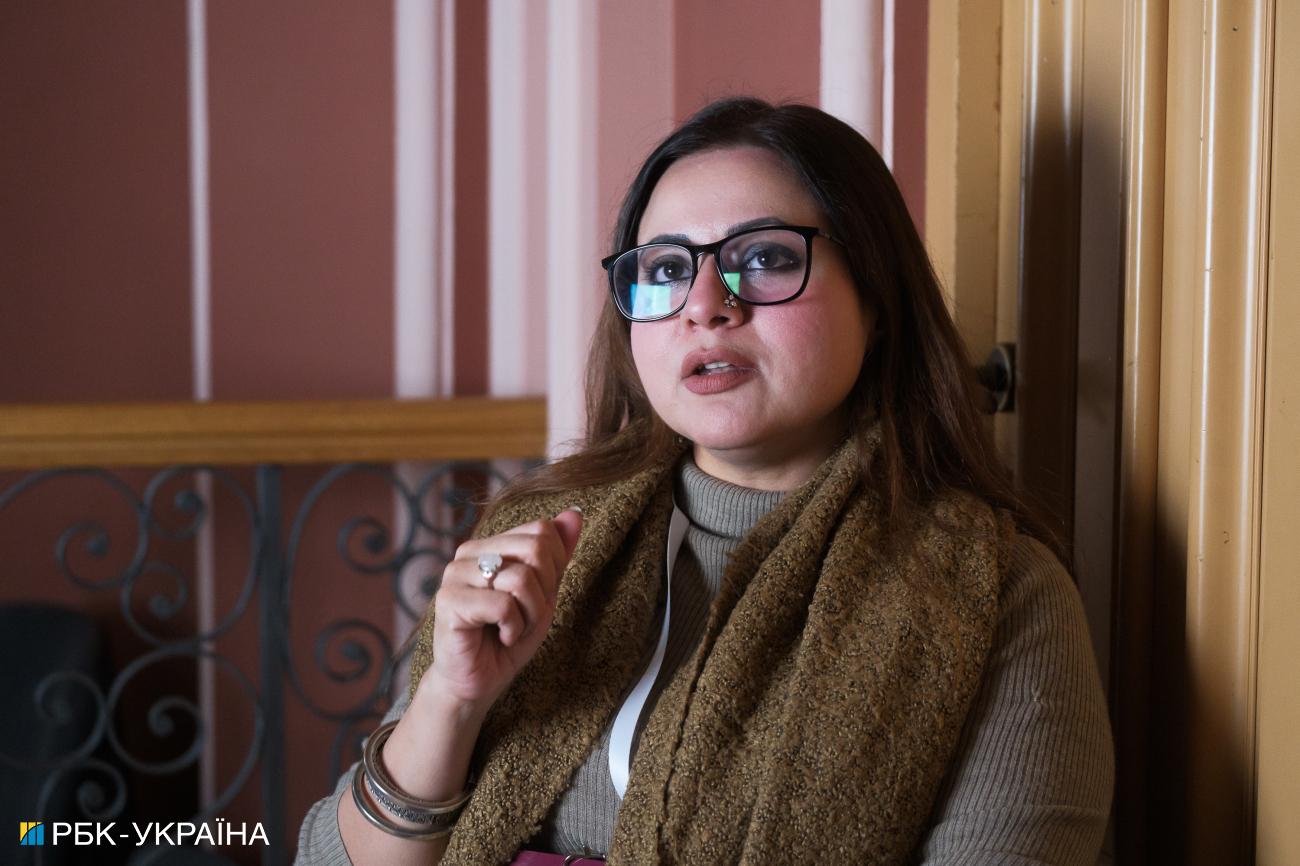 – India is one of the largest consumers of Russian oil. Is it just because of low prices?
– India is one of the largest consumers of Russian oil. Is it just because of low prices?
– One should know that India had never bought Russian oil before the war in Ukraine began. We got our oil from the Gulf countries. When the war started and when there were sanctions put on Russia, Russia wanted to reach out to other economies, and it gave us a lot of discounts. Because of the war, since the prices became so discounted, India started to buy a lot of oil from Russia. It is only because of the geopolitical situation. We never got our oil from Russia, but because of discounts and because India is so dependent on hydrocarbons, especially oil, we just started buying from Russia because we wanted to get as much as possible at a cheap cost.
Now the problem that has happened is that while we are importing a lot of oil from Russia, but we are not able to export in the same proportion and that has resulted in huge trade deficits with Russia. So today we have about 70 billion dollar worth of trade deficit and that is a problem. And we are really trying to wrap up that trade deficit, which is not happening because the rupee-ruble mechanism also has a problem. In Russia, we want to make payments in rupees. Rupees can't really be converted into rubles.
Russia should be investing that money back into India. Russia is doing it a little bit, not doing it so much, because the situation in the Ukraine war actually is very, very expensive for Russia also. And that is something that we often in India don't talk about, that it is a very expensive war, not only for Ukraine and the West, but it is a very expensive war for Russia also. And Russia would like to focus most of its hydrocarbon earnings on the war. And that is the reason why it is not investing everything back into India.
And the other problem is that because so many Russian firms remain sanctioned, therefore, very recently there was some news that about 19 Indian companies were sanctioned by the US for selling dual-use technology to Russia.
So because of these problems, the general trade from the Indian side is not able to pick up because we are, of course, very wary of sanctions. And today, the United States is a much more important trading partner to us than Russia. So those are the reasons why, even though we are getting a lot of oil, but we are not able to sell anything back to Russia. And as far as oil is concerned, tomorrow if we start getting it from a cheaper place, we will switch there.
So, we are buying oil because of discounts and because India's purchase of Russian oil allowed for the crude oil prices to remain stable also. Otherwise, they could have been very, very disturbed and turbulent. So in many ways, I think the oil rerouting has allowed for the G7 price cap and sanctions to work. And I think we have a very transparent communication with the Western partners over this. So they understand what is the reason that India is buying so much oil and under what conditions is India buying that oil.
– Let's talk about Russian propaganda in India taking into account that earlier India and the Soviet Union had very close ties. How has it transformed and how does Russia work with Indian public opinion and with the government, with the elites?
– It is true that Russian propaganda is very strong in the rest of the world generally because Russia was a very trusted partner from Soviet Union times. It has helped India in the 1971 war against Pakistan.
And like I also said because we have so much weapon dependence on Russia. So, especially for the older generation of bureaucrats, older generation of politicians, I think that love for Russia is very much there. But I think, when it comes to more hardcore issues of foreign policy, of national interest, geopolitics has completely changed. And today, while we would like to have our relationship with Russia maintained, but today the West is more important for India. Whether it is for trade, whether it's the gas industry, whether it's investment, whether it's diaspora, whether it's technology. You know, most importantly, all of that critical and emerging technology, Indo-Pacific region, all that convergence we have with the Western partners.
Russia happened to be a very important partner during the Cold War years. After the Cold War ended in the decade of 90s and 2000s, yes, we were trying to have a more globalist approach, more multipolar, but today we have security concerns from China's side.
We need to balance the rise of China because China makes sure that it doesn't let India rise. It doesn't want a multipolar Asia, it wants a unipolar Asia which is led by China. And India doesn't want that because India wants a multipolar world as well as a multipolar Asia. And today as Russia and China are coming closer, India has to obviously be mindful of that.
And the second thing is that as far as the Ukraine war is concerned, Russian propaganda is very, very popular. That Russia is winning the war. That President Zelenskyy is a stooge by the US. And well, I mean, the West should drop its support to Ukraine, and Ukraine should drop its pursuit of NATO, and everything will be fine.
And those of us who work in the security theater know that it is not about this. It is about the complete subjugation of Ukraine. And the Ukrainians are fighting for their freedom, and every country has a right for it. India has always stood for the United Nations Charter and international law, too. So I think I would agree that Russian propaganda is indeed strong. But like I said, Prime Minister Modi's visit actually started this process of de-hyphenation (it is a form of foreign policy where a country keeps diplomatic ties with two or more countries with conflicting interests, without letting the conflicts prioritize one country over another - ed.), which is that we are now trying to play a larger role in the reconstruction of Ukraine.
And therefore we are trying to also understand it from a different perspective. And one of the reasons why experts like me actually started working on this was also because we wanted to understand what was going on. Because a war which was supposed to last only three days is going on for three years.
– What could Ukraine do to counter Russian propaganda in India?
– I think Ukraine is doing a great job, but because it has a lot of resource constraints, diplomatic-level engagement must continue, of course. But more than that, I think also the civil society, the scholars, the conferences, more joint publications, more think-tank level associations, all of that will work because I will say that on record that we still have a very poor understanding in India of the East European security theater. When we look at Europe, for the longest time we have been looking only at the big four countries like the UK, France, Germany, and Russia.
So what is the concern of the East European countries? Why is it? You know, in India there is a very popular understanding that NATO is pushing westward and eastward and that is why Russia is retaliating, which is not the truth. Because if you ask all the Central and East European countries, they have lobbied for years to get into NATO because for them, getting into NATO is the only way that they can guarantee their territorial integrity and sovereignty.
So I think, those kinds of narratives can change only when there are more experts, there are more conferences, there is more people-to-people contact. There's also the fact of thousands of Indian students studying in Ukraine and they don't want to leave Ukraine. There are so many businessmen who are in Ukraine, they don't want to leave Ukraine. These stories don't reach out to India. So I think that conversation needs to be built.
But alongside the diplomatic level, engagement has to go on. I think ultimately India will always operate in India's national interest. So ultimately one has to convince that to play a larger role in the reconstruction of Ukraine, to play a larger role in making Ukraine a strategic gateway for Europe, I mean those things are in India's national interest. It's plain and simple.
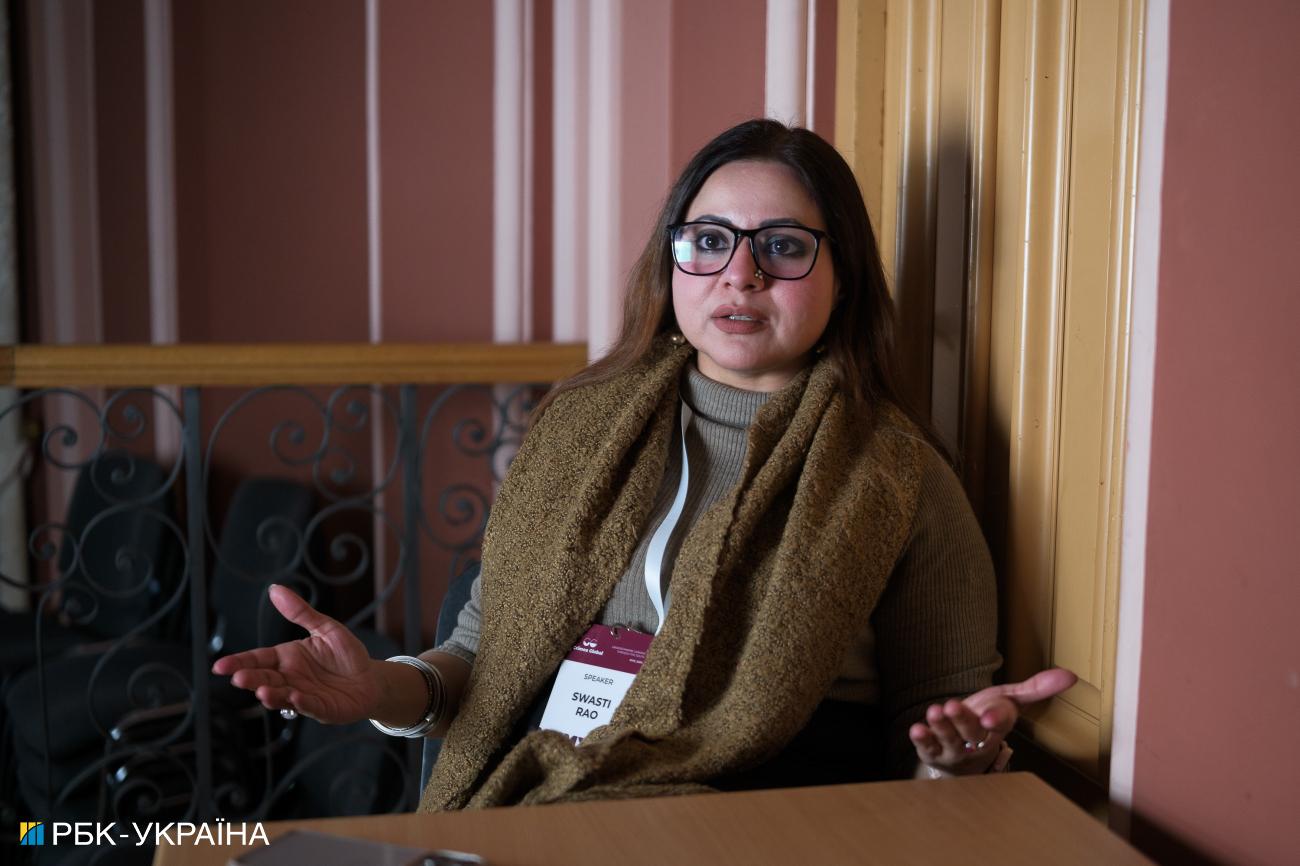
Because I don't think Ukraine is asking India to cut off its ties with Russia. I have met Minister Dmytro Kuleba himself when he came to India. He said, no, you can have your ties with Russia, it's fine. But what we want you to do is that we want you to understand why this is happening and explore how we can build our own bilateral relations.
So in short I would say Ukraine should pursue a strategy of what is called Russia plus one, which means that, okay, you have your ties with Russia, you can take care of that. But you should also be open to developing ties with Ukraine and the larger world and maybe stabilize the East European security theater by being a country that is committed to peace.
– At the end, I want to ask you about Donald Trump's comeback. Is it a challenge or a possibility?
– In the US, there is a bipartisan consensus for India because of Indo-Pacific. And because Trump is going to be more hawkish on China, it is going to be more favorable to India in many ways. But yeah, this is more in a geopolitical sense.
Practically, Trump also remains a very transactionalist kind of a figure. And India prefers the Republicans because they don't lecture us like the Democrats do. So they don't comment on democratic backstabbing in India, human rights, minorities. And India gets uncomfortable with that because India's like, okay, you're not supposed to get statements on our domestic issues like that. Nobody has given you that power, we are a sovereign country. So when it is about strategic communication, we find it easier to talk to Republicans.
But Trump is also known to be somebody who has called out publicly against India's misusing tariffs. The US is India's biggest trading partner in many ways. It's the US and China. With China, we have a trade deficit of 100 billion dollars but with the US we have a trade surplus of 35 billion dollars. So we are very sensitive to the fact that Trump should not make America and India trade in a more protectionist manner because then it is going to impact our trade surplus.
And so Trump is going to be more transactional, Trump is going to be more protectionist, Trump will force India to either open up its markets, so that American goods can also come, or Trump is also being very restrictive on the H1B visa which is again against India's interest because India's services are a very, very huge export that India does. So long story short, as far as the geopolitical scenario is concerned, especially with respect to the Indo-Pacific region, there is going to be continuity.
But because Trump is more transactional, we should see there would be some points of friction, which would be on trade protectionism, on H1B visa, and perhaps also Trump might also force India to fall more in line when it comes to China.

